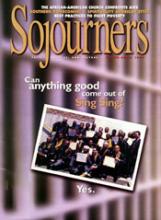At his death in 1996, eulogies referred to Henri Nouwen as one of the most significant spiritual writers of the century. He also understood that spirituality has social implications. The struggle for justice and peace was an essential part of Nouwen's walk with Jesus, and from Selma to Atlanta, from Nicaragua to Peru, from the nuclear test site in Nevada to Peace Pentecost in Washington, DC., he walked that walk.
The Road to Peace, edited by John Dear, brings together for the first time Nouwen's writings on peacemaking, racial equality, hearing the cry of the poor, and the solidarity of the human family. Several of the pieces are previously unpublished, and the collection rounds out the picture of his life and thought. For someone who has been deeply involved in the struggle for peace for nearly three decades, it is rich material for reflection.
For Nouwen, the essential element of peacemaking is prayer. It is, he writes, "the beginning and the end, the source and the fruit, the core and the content, the basis and the goal for all peacemaking...precisely because in prayer we come to the realization that we do not belong to the world in which conflicts and wars take place, but to him who offers us his peace."
Finding time for prayer is one of the constant challenges of an activist life. Nouwen gently reminds us that "we often have to take time to pray, and recognize prayer as the first and foremost act of resistance against militarism. By allowing ourselves quiet time with God we act on our faith that the peace we want to bring is not the work of our hands or the product of movements we join, but the gift of Christ."
Read the Full Article
